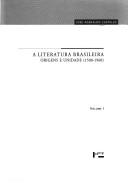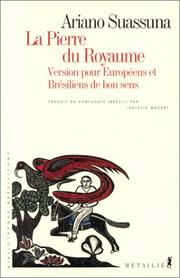| Listing 1 - 10 of 279 | << page >> |
Sort by
|
Book
ISBN: 9788835935605 8835935601 Year: 1992 Publisher: Roma: Ed. Riuniti,
Abstract | Keywords | Export | Availability | Bookmark
 Loading...
Loading...Choose an application
- Reference Manager
- EndNote
- RefWorks (Direct export to RefWorks)

ISBN: 9788531405051 853140505X Year: 1999 Publisher: São Paulo: Universidade de São Paulo,
Abstract | Keywords | Export | Availability | Bookmark
 Loading...
Loading...Choose an application
- Reference Manager
- EndNote
- RefWorks (Direct export to RefWorks)

ISBN: 2864242680 9782864242680 Year: 1998 Publisher: Paris: Métailié,
Abstract | Keywords | Export | Availability | Bookmark
 Loading...
Loading...Choose an application
- Reference Manager
- EndNote
- RefWorks (Direct export to RefWorks)
Un royaume messianique, fondé sur deux pierres enchantées, a été établi dans le haut sertao de Paraiba, puis il a disparu. Quaderna, poète-bibliothécaire d'une petite ville de la région, témoigne devant le juge, qui s'efforce de découvrir la dimension politique des luttes qui ensanglantent le nord-est du Brésil depuis un siècle.
Book
Abstract | Keywords | Export | Availability | Bookmark
 Loading...
Loading...Choose an application
- Reference Manager
- EndNote
- RefWorks (Direct export to RefWorks)
Book
Year: 2000 Publisher: L'Aquila: Angelus novus,
Abstract | Keywords | Export | Availability | Bookmark
 Loading...
Loading...Choose an application
- Reference Manager
- EndNote
- RefWorks (Direct export to RefWorks)
Book
Year: 1964 Publisher: Rio de Janeiro: Agir,
Abstract | Keywords | Export | Availability | Bookmark
 Loading...
Loading...Choose an application
- Reference Manager
- EndNote
- RefWorks (Direct export to RefWorks)
Book
Year: 1984 Publisher: Rio de Janeiro, R.T. : Editora Nova Fronteira,
Abstract | Keywords | Export | Availability | Bookmark
 Loading...
Loading...Choose an application
- Reference Manager
- EndNote
- RefWorks (Direct export to RefWorks)
Book
Year: 1996 Publisher: São Paulo : Cultrix,
Abstract | Keywords | Export | Availability | Bookmark
 Loading...
Loading...Choose an application
- Reference Manager
- EndNote
- RefWorks (Direct export to RefWorks)
Book
Year: 2004 Publisher: West Lafayette : Purdue University Press,
Abstract | Keywords | Export | Availability | Bookmark
 Loading...
Loading...Choose an application
- Reference Manager
- EndNote
- RefWorks (Direct export to RefWorks)
This study by Cristina Ferreira-Pinto explores the poetic and narrative strategies twentieth-century Brazilian women writers use to achieve new forms of representation of the female body, sexuality, and desire. Female writers discussed include: Gilka Machado, Lygia Fagundes Telles, Marcia Denser, and Marina Colasanti. While creating new forms, these writers are also deconstructing cultural myths of femininity and female behavior. In order to understand these myths, the book also presents new readings of some male-authored canonical novels by Jose de Alencar, Machado de Assis, Manuel Antonio de Almeida, and Aluisio Azevedo. The specific focus on female sexuality and desire acknowledges the intrinsic link between sexuality and an individual's sense of identity, and its importance for female identity, given the historical repression of women's bodies and the double standard of morality still pervasive in many Western cultures. In the discussion of the strategies Brazilian female poets and fiction writers employ, Ferreira-Pinto addresses some social and cultural issues that relate to a woman's sense of her own body and sexuality: the characterization of women based on racial features and class hierarchy; marriage; motherhood; the silencing of the lesbian subject; and aging. Ferreira-Pinto's analysis is informed by the works of various and diverse critics and theoreticians, among them Helene Cixous, Teresa De Lauretis, Adrienne Rich, Gloria Anzaldua, Georges Bataille, and Wilhelm Reich.
Book
Year: 2004 Publisher: West Lafayette : Purdue University Press,
Abstract | Keywords | Export | Availability | Bookmark
 Loading...
Loading...Choose an application
- Reference Manager
- EndNote
- RefWorks (Direct export to RefWorks)
This study by Cristina Ferreira-Pinto explores the poetic and narrative strategies twentieth-century Brazilian women writers use to achieve new forms of representation of the female body, sexuality, and desire. Female writers discussed include: Gilka Machado, Lygia Fagundes Telles, Marcia Denser, and Marina Colasanti. While creating new forms, these writers are also deconstructing cultural myths of femininity and female behavior. In order to understand these myths, the book also presents new readings of some male-authored canonical novels by Jose de Alencar, Machado de Assis, Manuel Antonio de Almeida, and Aluisio Azevedo. The specific focus on female sexuality and desire acknowledges the intrinsic link between sexuality and an individual's sense of identity, and its importance for female identity, given the historical repression of women's bodies and the double standard of morality still pervasive in many Western cultures. In the discussion of the strategies Brazilian female poets and fiction writers employ, Ferreira-Pinto addresses some social and cultural issues that relate to a woman's sense of her own body and sexuality: the characterization of women based on racial features and class hierarchy; marriage; motherhood; the silencing of the lesbian subject; and aging. Ferreira-Pinto's analysis is informed by the works of various and diverse critics and theoreticians, among them Helene Cixous, Teresa De Lauretis, Adrienne Rich, Gloria Anzaldua, Georges Bataille, and Wilhelm Reich.
| Listing 1 - 10 of 279 | << page >> |
Sort by
|

 Search
Search Feedback
Feedback About UniCat
About UniCat  Help
Help News
News